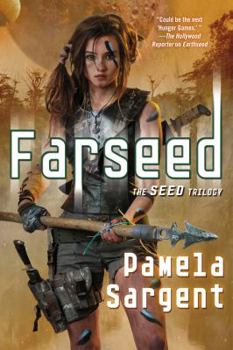Book Overview
Centuries ago, the people of Earth sent Ship into space. Deep within its core, it carried the seed of humankind....
Format:Paperback
Language:English
ISBN:0765332167
ISBN13:9780765332165
Release Date:January 2013
Publisher:Tor Teen
Length:288 Pages
Weight:0.60 lbs.
Dimensions:0.8" x 5.4" x 8.1"
Age Range:12 to 17 years
Grade Range:Grades 7 to 12
Customer Reviews
3 ratings
A Long Awaited Sequel to Earthseed!
Published by Thriftbooks.com User , 16 years ago
Pamela Sargent is a name that many fans of science fiction will recognize--this veteran SF author has been around for decades contributing her work to the genre. But it's been quite a while since she's been seen on the young adult shelves--so it was with equal parts delight and excitement I discovered her 1983 title, Earthseed, was being reprinted and that the second book in what is now going to be a trilogy had been released. For new readers to this trilogy, I highly recommend starting with Earthseed before cracking open this book. For readers who hoped this book would pick up seamlessly with the lives of Zoheret and Ho and the others from the first book--there may be some initial disappointment. This book is set about twenty years after they arrive on the planet they call Home and is more about the children of the original characters than the characters themselves. The original settlement has become somewhat complacent and unwilling to venture beyond its safe borders--while Ho's separated group has gone a different direction, struggling to survive on the alien planet. Nuy, Ho's daughter is sixteen when strangers come from the settlement after so many years of isolation. The resulting clash between groups is violent and shattering for Nuy--she must decide who to side with and what she wants for her life. In the end both groups must make choices and the colonists whether the price of giving their people a future on the planet is worth the risk. Those who haven't read the first book may be able to follow the story well enough to enjoy it, but it really works best as a follow up to Earthseed. Pamela Sargent delivers a good, solid SF read here--something that's been missing from YA and children's collections in recent years. As the Science Fiction Chronicle quote states, her work here is reminiscent of the better Heinlein juveniles--and that's meant in a good way. Sargent offers strong female protagonists, thought provoking scenarios and a wonderfully imaginative picture of what colonizing a new planet might be like. It's not light reading--there's a fair amount of violence and killing that goes on, and Ms. Sargent doesn't shy away from those harsh realities. It's also a fairly mature read, though the sexual content is overall light--I'd probably recommend this for 7th grade readers on up. I'd like to give this book five stars, as I'm so happy to see Ms. Sargent back in YA and giving new life to this series, but I didn't think it was quite a five-star book even so. Firstly, it really feels like a middle book in a trilogy--readers are best off tackling the book before it to understand what went on and who the older characters are. There are also bits and peices about the Ship that hint at things to come, but will mean little to a reader who has only read Farseed. Secondly, I did find that the book dragged a little in Part II of the story. Here, Ms. Sargent brings readers up to speed on the progression of the settlement, the dynamics o
A fascinating story of survival and struggle evolves
Published by Thriftbooks.com User , 17 years ago
This fine sequel of EARTHSEED requires no prior familiarity to prove enthralling for newcomers to Sargent's fantasy world. Over twenty years have passed since Ship left its children on an uninhabited, Earth-like planet named Home, and Zoheret and her companions have had their own children. Two groups of old shipmates make separate encampments and soon hostility breaks out and threatens their fragile new world. A fascinating story of survival and struggle evolves, highly recommended for any teen audience interested in solid characterization and involving science fiction.
fantastic science fiction
Published by Thriftbooks.com User , 17 years ago
Ship was created to find worlds that could contain human life and seed these orbs with humans. One of the first worlds to fulfill the requirement is Home where Ship deposited colonists. The colonists make up two groups. One segment led by Ho settles in the warm south while the rest headed by Zoheret moved into the coastal north. The people of the south lost much of their technology and devolved into a more\primitive lifestyle, while the Northerners built domes and relied on the technology brought from earth. Ho's teenage daughter Nuy sees three strangers approach from the north. She brings them to their village, but Ho assumes they bring death so he kills them and exiles his offspring. A year passes with the second generation Northerners wanting to know what happened to their compatriots. At a town hall meeting Leila a second generation person wants to send a second expedition to the South and she is supported by the settlement so they go south to find out the truth. When they camp for the night, Ho sends his forces to attack them killing two of the campers. Leila insists on continuing and soon meets Nuy, who wants to save both groups from her out of control parent. Two groups, one primitive and one advanced, battle for control with some in power (on both sides) preferring the status quo. It takes the female adventurers from both sides to demand change and go against the status quo established by the original landing party. Pamela Sargent has written a fantastic science fiction novel that shows how humans adapt to new environs. FARSEED is enjoyable and exciting as readers will care what happens to the colonists especially the heroic offspring.






